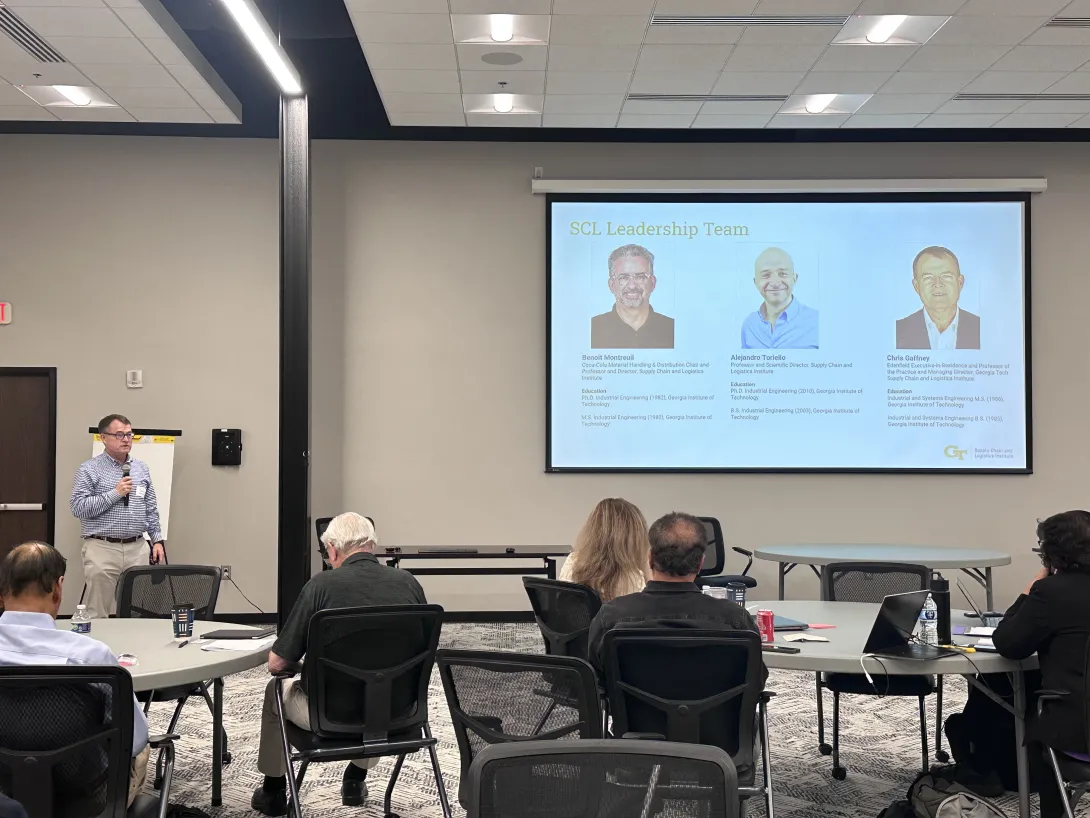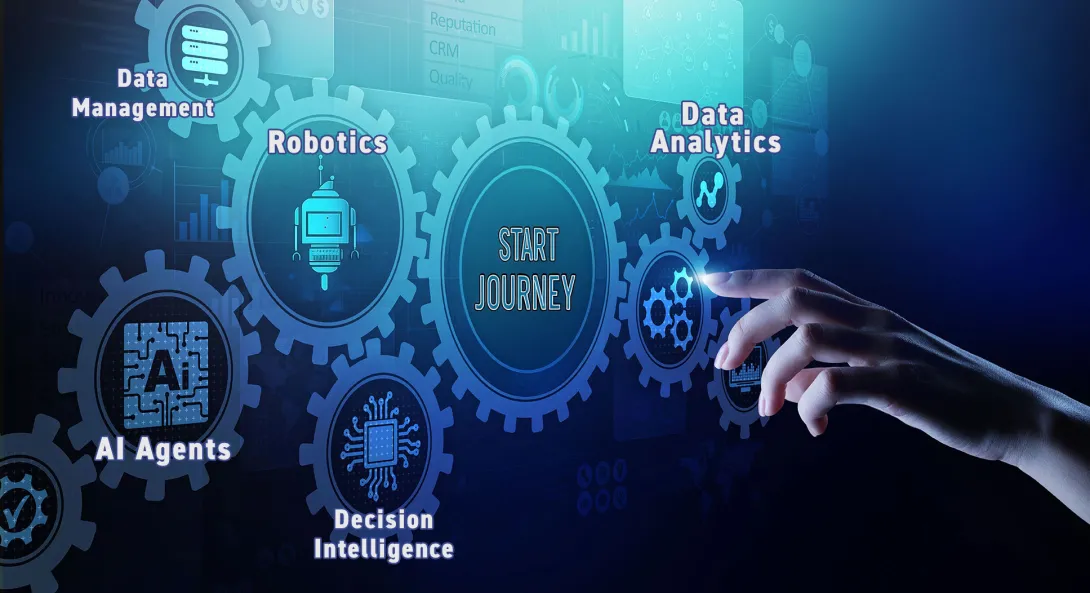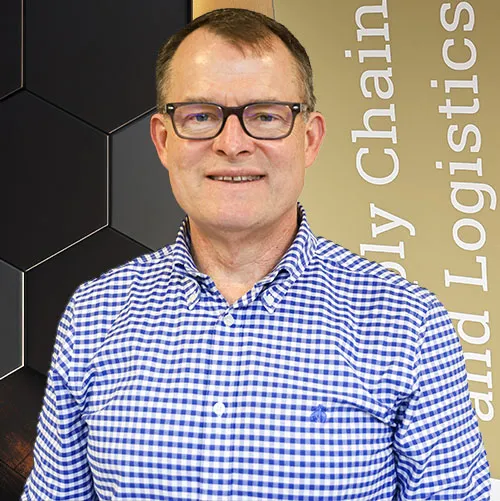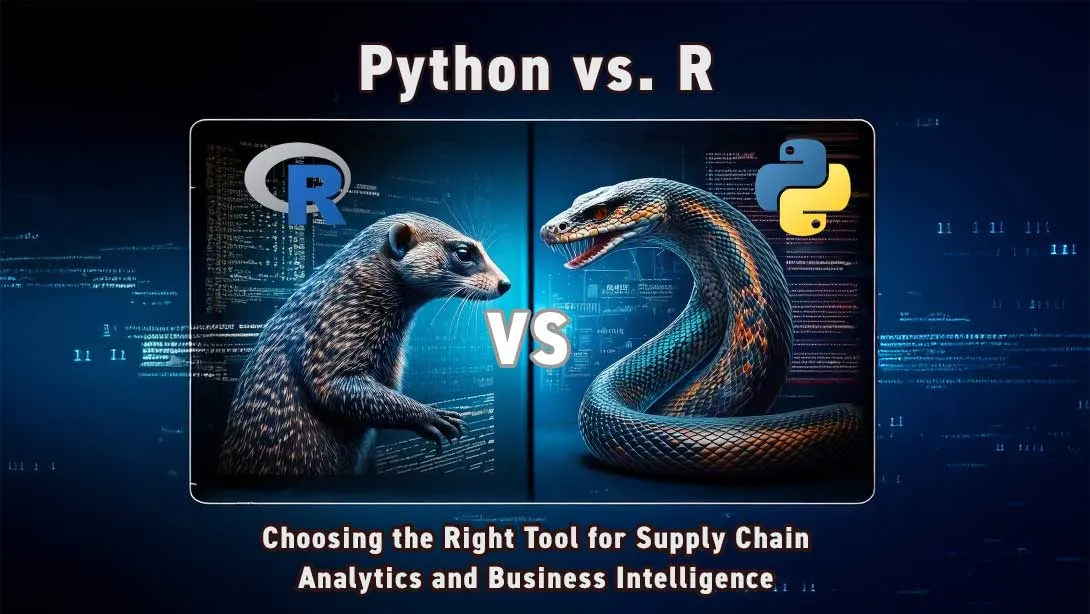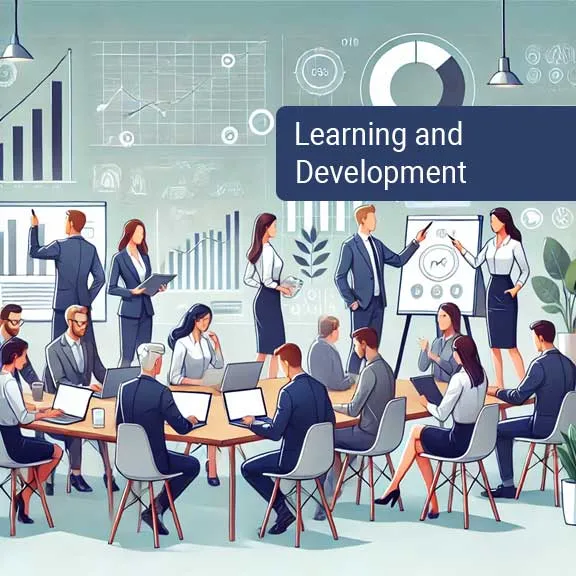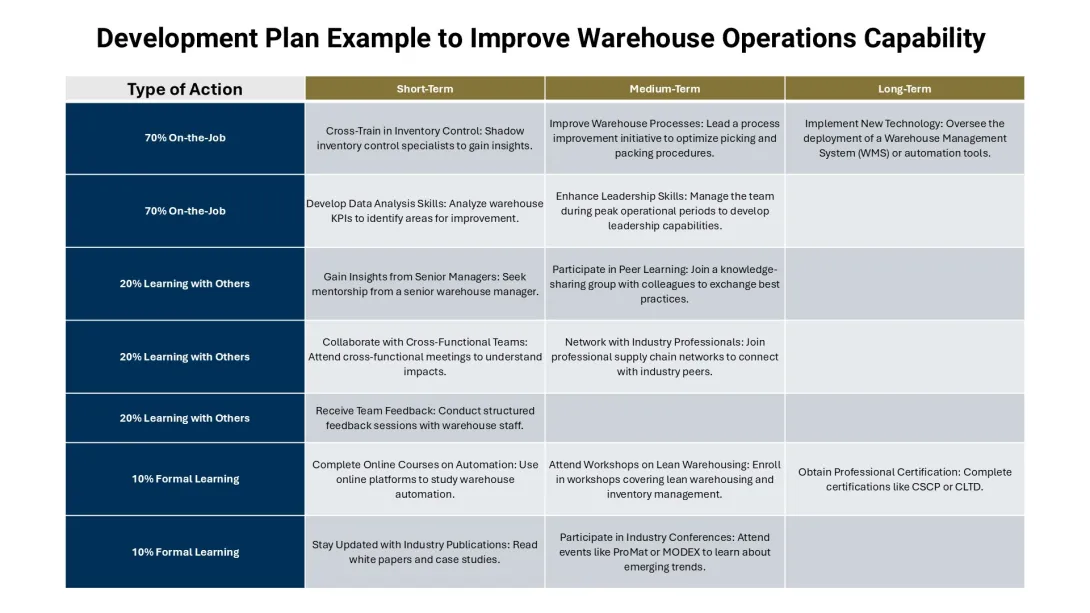May. 22, 2025
Last month, I had the opportunity to represent Georgia Tech SCL at the joint GEMs-GRACE workshop in Macon, hosted by partners from Georgia Tech, the Georgia Mining Association, and the Middle Georgia Regional Commission. The event brought together 70 participants from 36 organizations across economic development, academia, national labs, non-profits, and industry—underscoring the importance and growing momentum around critical mineral development in our region.
The agenda featured a strong lineup of speakers covering use-inspired R&D, workforce development, translation and commercialization, and ecosystem sustainability. Highlights included insights from leaders at the Strategic Energy Institute, Georgia Cleantech Innovation Hub, Savannah River National Lab, Southern Company, and others. I contributed a perspective on the critical role of supply chain design in optimizing the development of any new critical mineral supply chain—ensuring we design networks from the start that are scalable, resilient, and efficient.
Perhaps the most valuable elements of the day were the breakout sessions and informal networking, where participants explored how we can collectively advance resource development with greater speed, innovation, and shared benefit. The level of engagement and openness to collaboration was impressive.
We’re now turning our attention to shaping a full proposal to support this initiative, and I’m encouraged by the alignment and energy coming out of this session. Many thanks to Dr. Yuanzhi Tang and the organizing team for bringing this community together in such a purposeful way.
Chris Gaffney
Managing Director, Georgia Tech Supply Chain and Logistics Institute
News Contact
info@scl.gatech.edu
Mar. 17, 2025
Today's supply chain industry is undergoing a rapid transformation, driven by AI, robotics, and data analytics. These innovations are already delivering measurable efficiency gains, and fast followers – companies that quickly adopt proven technologies – must take action or risk falling behind. Using a "consequence thinking" approach, supply chain professionals and students must ask: What happens if I’m not keeping up with these trends? Those who proactively invest in emerging technologies and their own skills will be better positioned to compete, those who don’t take action in 2025 will struggle with inefficiencies and higher costs. Georgia Tech, a leader in supply chain research and education, is actively exploring these areas, reinforcing that these trends are not just hype but a critical reality.
AI Agents and Decision Intelligence
AI is moving beyond forecasting and analytics into autonomous decision-making. AI agents can rapidly process complex scenarios—such as supply disruptions—and generate optimal responses in real time. This shift reduces reliance on manual problem-solving and enables organizations to respond faster and with greater accuracy. These AI-driven systems also make insights more accessible, allowing non-technical professionals to interact with advanced analytics in natural language.
Georgia Tech’s Supply Chain and Logistics Institute is offering education in Generative AI for supply chain, helping professionals understand and apply these tools effectively. The key takeaway? AI isn’t just for data scientists—it’s becoming essential for all supply chain professionals. Investing in AI literacy and decision intelligence training will be critical to staying relevant in the field.
Physical Automation: AMRs Reshaping Warehouses
Automation in warehouses is no longer experimental—it’s here and delivering results. Autonomous mobile robots (AMRs) are replacing traditional automation solutions, offering greater flexibility and adaptability. Unlike AGVs, which rely on fixed paths, AMRs navigate dynamically using AI and real-time mapping, making them well-suited for evolving warehouse environments.
Companies deploying AMRs report increased throughput, reduced labor costs, and improved safety. These robots optimize workflows, assist human workers, and enable 24/7 operations. Georgia Tech researchers are developing human-collaborative robotics, reinforcing that the future is about augmenting—not replacing—workers. Supply chain professionals should focus on developing skills in automation management and AI-driven operations. Understanding how to integrate these technologies into workflows will be a key differentiator.
Data Management: The Foundation for AI and Automation
AI and automation depend on high-quality, well-integrated data, yet many organizations struggle with fragmented systems and poor data governance. Industry surveys consistently highlight that supply chain leaders cite data silos and quality issues as top barriers to digital transformation. Without a strong data foundation, even the best AI models and automation solutions will fail to deliver their full potential.
Modern supply chain visibility platforms and AI-powered analytics tools are helping companies consolidate data for better decision-making. Georgia Tech researchers are advancing digital twin models that simulate supply chain networks, but these rely on robust data integration. For professionals, this underscores the need to develop data literacy and analytical skills. Those who can navigate, interpret, and leverage data effectively will be indispensable in AI-powered supply chains.
Call to Action: Personal Development and Strategic Planning
Emerging technologies in supply chain—AI, automation, data analytics, and logistics AI—are no longer futuristic concepts. They are delivering tangible benefits now, and the gap between early adopters and laggards is widening. If these innovations are not on your radar, you need to take action.
Where to Start:
- Invest in Personal Development: AI, automation, and data skills are becoming core competencies. Take relevant courses, attend industry events, and seek practical experience.
- Assess Business Applications: Identify where these technologies can solve current challenges and improve efficiency in your supply chain.
- Build Data Competency: Understanding how to structure and leverage data is foundational for AI and automation success.
- Experiment with Emerging Tech: Pilot AI-driven decision tools, AMRs, or logistics optimization models to gain insights into their potential.
The future of supply chain management is being reshaped by these technologies, and those who prepare now will define the next era of supply chain excellence. The question is no longer if these tools will impact the industry—it’s how quickly you can learn to use them to your advantage.
News Contact
info@scl.gatech.edu
Feb. 20, 2025
In today's data-driven world, supply chain professionals and business leaders are increasingly required to leverage analytics to drive decision-making. As companies invest in building data capabilities, one critical question emerges: Which programming language is best for supply chain analytics—Python or R?
Both Python and R have strong footholds in the analytics space, each with unique advantages. However, industry trends suggest a growing shift toward Python as the dominant tool for data science, machine learning, and enterprise applications. While R remains valuable in specific statistical and academic contexts, businesses must carefully assess which language aligns best with their analytics goals and workforce development strategies.
This article explores the strengths of each language and provides guidance for industry professionals looking to make informed decisions about which to prioritize for their teams.
Why Python Is Gaining Industry-Wide Adoption
1. Versatility and Scalability for Business Applications
Python has evolved into a comprehensive tool that extends beyond traditional analytics into automation, optimization, artificial intelligence, and supply chain modeling. Its key advantages include:
- Scalability: Python handles large-scale data processing and integrates seamlessly with cloud computing environments.
- Machine Learning and AI: Python’s ecosystem includes powerful machine learning libraries like scikit-learn, TensorFlow, and PyTorch.
- Integration Capabilities: Python works well with databases, APIs, and ERP systems, embedding analytics into operational workflows.
2. Workforce Readiness and Talent Development
From a talent perspective, Python is becoming the preferred programming language for data science and analytics roles. Surveys indicate that Python is used in 67% to 90% of analytics-related jobs, making it a crucial skill for professionals. Employers benefit from:
- A larger talent pool of Python-proficient professionals.
- A lower barrier to entry for new employees learning data analytics.
- The ability to streamline analytics processes across different functions.
3. Industry Adoption in Supply Chain Analytics
Python is widely adopted in logistics, manufacturing, and supply chain optimization due to its ability to handle:
- Demand forecasting and inventory optimization.
- Network modeling and simulation.
- Automation of data pipelines and reporting.
- Predictive maintenance and anomaly detection.
Why R Still Has a Place in Analytics
Despite Python’s widespread adoption, R remains a valuable tool in certain business contexts, particularly in statistical modeling and research applications. R’s strengths include:
- Advanced Statistical Analysis: R was designed for statisticians and remains a leader in econometrics and experimental design.
- Robust Visualization Capabilities: Packages like ggplot2 and Shiny make R a preferred choice for creating high-quality visualizations.
- Adoption in Public Sector and Academic Research: Many government agencies and research institutions continue to rely on R.
Strategic Considerations: Choosing Between Python and R
1. Business Needs and Analytics Maturity
- For companies focused on predictive analytics, automation, and AI, Python is the best choice.
- For organizations conducting deep statistical research or working with legacy R code, maintaining some R capabilities may be necessary.
2. Workforce Training and Skill Development
- Companies investing in analytics training should prioritize Python to align with industry trends.
- If statistical expertise is a core requirement, R may still play a supporting role in niche applications.
3. Tool and System Integration
- Python integrates more seamlessly with enterprise software, making it easier to operationalize analytics.
- R is often more specialized and may require additional effort to connect with business intelligence platforms.
4. Future Trends and Technology Evolution
- Python’s rapid growth suggests it will continue to dominate in analytics and AI.
- While R remains relevant, its role is becoming more specialized.
Final Thoughts: A Pragmatic Approach to Analytics Development
For most organizations, Python represents the future of analytics, offering the broadest capabilities, strongest industry adoption, and easiest integration into enterprise systems. However, R remains useful in specialized statistical applications and legacy environments.
A balanced approach might involve training teams in Python as the primary analytics language while maintaining an awareness of R for niche use cases. The key takeaway for business leaders is not just about choosing a programming language but ensuring their teams develop strong analytical problem-solving skills that transcend specific tools.
By strategically aligning analytics capabilities with business goals, organizations can build a more data-driven, adaptable, and future-ready workforce.
Jan. 13, 2025
The new year provides a natural opportunity to refocus on professional growth. For busy supply chain professionals, development planning can often fall to the bottom of the priority list, especially amidst the daily challenges of managing operations and responding to disruption. Yet, this intentional focus on skill-building is more critical than ever.
As Managing Director of the Supply Chain and Logistics at Georgia Tech, I’ve seen firsthand how development planning can elevate individual careers, strengthen teams, and improve organizational resilience. However, the key to making it work lies in balancing the demands of day-to-day operations with actionable, targeted development efforts.
The Reality of Development Windows
The structure of the working calendar doesn’t make development planning easy. Between the end-of-year holiday season and summer vacation months, supply chain professionals face two primary windows for development:
- Spring (February through May): Coming off the end-of-year slowdown, spring provides the first extended opportunity to focus on growth.
- Fall (Mid-August through Mid-November): After summer, fall offers a second chance to refocus before the holiday rush begins.
For supply chain professionals, these windows represent critical periods to upskill and prepare for the evolving demands of the industry. The spring window is upon us, making now the perfect time to act with urgency and purpose.
The “Why” of Development Planning
In supply chain, the "why" behind development planning is straightforward: the industry is changing faster than ever. New technologies, shifting global trade patterns, and the increasing complexity of operations demand professionals who are both technically skilled and strategically agile.
The supply chain leaders of tomorrow must excel in areas like:
- Data and Analytics: Understanding data and leveraging it for decision-making is no longer optional.
- Automation and Technology: From warehouse robotics to AI-powered forecasting, supply chain professionals need to be tech-savvy to stay relevant.
- Resilience and Risk Management: Building robust supply chains capable of withstanding disruption is now a core competency.
The “What” of Development Planning: Key Focus Areas
Development can be broken into two primary areas:
1. Core Competencies (In-House):
- Communication: Clear, concise, and persuasive communication is critical for collaboration.
- Problem-Solving: Supply chains are inherently complex, and professionals must excel at diagnosing and resolving issues.
- Leadership and Teamwork: Even non-managers need strong leadership and collaboration skills to succeed in today’s cross-functional environments.
Here is a link to one of the best competency guides out there: FYI Resource Center
2. Technical and Operational Skills:
- Advanced Analytics and Visualization: Skills in tools like Power BI, Tableau, or Python are becoming industry standards.
- Supply Chain Systems and Automation: Understanding the functionality and implementation of WMS, TMS, and other critical systems is vital.
- Sustainability and Compliance: Professionals need to navigate increasingly complex sustainability requirements and global regulations.
Beyond these newer technical areas, there remain significant gaps in the application of many core supply chain processes—gaps that cannot be overlooked:
- Production and Inventory Planning: Effective planning processes are critical, yet many organizations struggle to optimize them to balance demand and capacity.
- Warehouse Operations and Optimization: Opportunities remain to improve material flow, labor efficiency, and space utilization in warehouse environments.
- Manufacturing Asset Reliability and Output: Ensuring consistent and reliable equipment performance is essential to maintaining throughput and meeting customer expectations.
- Tradeoff Analysis for Purchasing Decisions: Striking the right balance between low cost, resilience, and sustainability is an increasingly complex challenge, especially in the face of rising customer and consumer pressure for speed and service.
A Quick Action Plan Using the 70/20/10 Model
For supply chain professionals with limited time and access to leading practices, the 70/20/10 model offers a practical framework for development:
- 70% Experiential Learning: Apply learning directly in your work.
- 20% Social Learning: Learn from others in your network or organization.
- 10% Formal Learning: Invest in structured learning opportunities.
Please see attached figure 1 for Development Plan Example to improve Warehouse Operations Capability
Here is a link to a free Individual development GPT in Chat GPT: Individual Development Plan Builder
Call to Action: Take 30 Minutes to Plan Today
For busy professionals, the biggest hurdle to development planning is often finding the time. But a well-crafted development plan doesn’t have to take hours. Here's how you can get started in just 30 minutes:
- Reflect on Your Growth Needs (10 Minutes): Where do I need to grow most?
- Set Three Development Goals (10 Minutes): Identify experiential, social, and formal learning goals.
- Identify Next Steps (10 Minutes): Write down one immediate action for each goal.
- Schedule time with Manager to review proposed plan and schedule monthly check-ins
Development as a Competitive Advantage
The pace of change in supply chain operations is relentless, but professionals who make development a priority can turn that challenge into a competitive advantage. By leveraging the 70/20/10 model and focusing on intentional, actionable planning, you can position yourself—and your team—for success.
Don’t let this spring window pass without taking steps toward growth. Whether it’s mastering a new technology, improving core processes, or navigating tradeoff decisions, the time to act is now. If your growth plan includes professional education, consider how the Supply Chain and Logistics Institute and Georgia Tech Professional Education might benefit you!
News Contact
Nov. 21, 2024
Martin Luther Hubbard is Vice President of Supply Chain Operations at The Coca-Cola Company. Martin is an accomplished Business Leader with over 25 years of progressive leadership roles in Supply Chain Operations, International Logistics Management and Financial Controllership. He has broad and comprehensive experiences supporting Fortune 200 companies in the Consumer Products Goods and Automotive Industries and is known as a transformational leader.
During his 20-year career at The Coca-Cola Company, Martin assumed several roles with increased responsibilities in Houston and Atlanta. In his current role as Vice President, Supply Chain Operations, he leads a team that focuses on delivering our innovation initiatives, driving strategic supply chain solutions, and delivering multi-year Design-to-Value/Sustainability savings.
Martin began his career at the Eaton Corporation in Atlanta, GA where he held several positions including, Plant Financial Controller, Plant Manager, and finally Global Supply Chain Lead. In those roles, he was able to improve manufacturing output, employee engagement and financial performance for the facility he managed.
Martin also provides supply chain and finance consulting as a board member for local non-profit organizations.
Martin is a native of Atlanta, GA. He obtained his bachelor’s degree in Accounting | Finance from Georgia State University and his Master’s Degree in International Business from Mercer University (GA). He is also a practicing CPA in the State of Georgia.
SCL appreciates Mr. Hubbard's participation in our Industry Advisory Board and his willingness to lend his expertise to help shape our strategic initiatives into 2025.
Oct. 21, 2024
Alex Hamrick is the Vice President of Supply Chain Analytics, Channel Optimization, and PMO at The Home Depot. Alex and his team are responsible for end-to-end analytics, data science, data architecture, and project management functions for The Home Depot supply chain. This includes optimizing product flow path selection, product stocking location optimization, forecasting and capacity planning in the distribution centers, network optimization, cost and service optimization in our transportation and delivery operations, and SKU productivity in the supply chain network. Alex’s teams apply traditional analytical methods and are actively developing machine learning and AI use cases across the supply chain.
Over the last twelve years at The Home Depot, Alex has held roles of increasing responsibility in both operational and analytical functions in both The Home Depot's online and store businesses. Prior to joining The Home Depot, Alex worked for CHEP in a variety of supply chain roles including network optimization, demand forecasting, and inventory.
Alex holds a Master’s degree in Economics from the University of Virginia and Bachelor’s degrees in Applied Mathematics, Statistics, and Economics from the University of Central Florida. He grew up in Tampa, Florida and currently resides in Atlanta, Georgia with his wife and two daughters.
SCL appreciates Alex's participation and will leverage his expertise in supply chain analytics, data science, and project management to help shape our strategic initiatives into 2025.
Jul. 25, 2023
Valerie Thomas, Anderson-Interface Chair of Natural Systems and Professor in the H. Milton School of Industrial and Systems Engineering, was recently asked to speak as part of Sustainability Research + Innovation (SRI) Congress 2023. The event was hosted online and at the Panama Convention Center by the National Secretariat of Science, Technology, and Innovation of the Republic of Panama (SENACYT) and the Inter-American Institute for Global Change Research (IAI).
Sustainability Research + Innovation Congress 2023 is the world's largest gathering for the global sustainability community, and for the first time, the event took place in the Latin American and Caribbean Region. SRI unites more than 2000 global sustainability research leaders, government and civil society experts, funders and innovators to inspire action and promote a sustainability transformation. The global and annual event elevates diverse knowledge on sustainability, provides an inspiring platform to share innovative ideas, and creates an inclusive space for collaboration and action. SRI is a joint initiative of Future Earth and the Belmont Forum.
As part of the Fri Jun 30 panel session "Reducing Emissions from Logistics", Thomas discussed "Life-cycle Approaches to Assessing Emissions from Logistics." To help provide the academic perspective, she was joined by Marilyn Brown, Regents' and Brook Byers Professor of Sustainable Systems in the School of Public Policy, who spoke on "Three trends challenging U.S. and global emissions reductions from logistics." The private sector perspective was provided by Alex Rodriguez, Regional Head of Energy Transition Execution - LAM with A.P. Moller - Maersk. Rodriquez provided a broad and interesting discussion of air-water-land logistics, its impact on the environment, and possible future solutions. The session was organized by Jorge Barnett Lawton, Managing Director of the Georgia Tech Panama Logistics Innovation & Research Center, who also moderated the session from Panama City.
To learn more about the annual event and view available recordings, please visit https://sricongress.org/.
Jan. 30, 2023
Becky Francosky is the Director of Air Service Development at Hartsfield-Jackson Atlanta International Airport (ATL). She has more than 15 years of experience in strategic planning, market research, analytics and project management that has been refined in roles in both the private and public sector. Ms. Francosky has broad experience in conducting primary and secondary research, analyzing market and competitive intelligence, gap analysis, forecasting and leveraging analytical frameworks to develop forward-looking and extrapolative insights.
Becky rejoined Hartsfield-Jackson in 2022 after working extensively with ATL on several key analytical studies through her company Advanced Aviation Analytics. While in her consulting role, she worked on a variety of projects including the Economic Impact Study, management dashboards and frameworks for gate utilization and forecasting. She has recruited several international passenger and cargo airlines and frequently engages with current and prospective airlines to help build stakeholder engagement.
Additionally, Becky plans and coordinates economic and business development activities with a variety of state and local organizations. From 2008 to 2012, Becky directed the market research program to understand customer’s preferences and needs, which led to expanded product and service offerings and increased non-aeronautical revenue by 40 percent.
We are very excited to have Becky join our board, lend us her expertise, and continue ATL's participation and support of SCL programs.
Dec. 01, 2022
Todd Ullom has over 30 years' experience as an entrepreneur, developer, general contractor, technologist, and market strategist holding senior executive positions with both private and public companies. He is currently vice president for MiTek, a wholly owned subsidiary of Berkshire Hathaway, leading the development of the company’s distributed construction platform which is initially focused on offsite volumetric assembly of hotels. He joined MiTek as part of the acquisition of Innovation Builder, a technology company founded by Todd with a focus on solving the construction industry's toughest problems. Throughout his career, Todd has managed both growth and turnaround companies, developed new business opportunities, designed industry leading business processes and developed innovative marketing strategies. His experience includes founder and president of a bespoke building company; senior leadership positions in large private and public construction companies including COO, region president, VP of strategy and operations; and VP of strategy and business development for a technology firm.
Todd has developed more than $2.5 billion in real estate with annual P&L responsibility of more than $500 million and developed turnaround programs for over 50 projects during the financial crisis. He has developed industry leading processes for scheduling, purchasing and trade relationships. Todd created the Martha Stewart and Ralph Lauren branded home programs and has developed creative customer centric product designs and selling strategies. He has provided business and technology consulting for more than 200 builders and contractors of all sizes throughout North America. Todd has also served in numerous capacities constructing large scale commercial projects that include major medical research facilities, hospitals, dormitories, hotels and club houses.
Todd has a B.S. in Building Construction from the Georgia Institute of Technology, is a licensed Florida general contractor and sales associate, certified in advanced design thinking through IDEO and is a certified leadership coach with John Maxwell. He is a former president of the Atlanta Homebuilders Association, was named as one of Seattle’s Top Business Executives Under 40 in 1999, received the Lee Evans Award for Management Excellence in 2012, was named America’s Best Builder in 2013 and currently serves on the Board of Governors for the non-profit Opportunity International.
Oct. 26, 2022
Joe Verbraska joined Steelcase in 1995 and currently serves as Director of Global Logistics. Throughout his 27-year career at Steelcase, Mr. Verbraska has worked as a Financial Analyst, led manufacturing operations in two of the largest plants for Steelcase North America, served as Director of Logistics Operations in Europe, and was Director of North American Logistics with responsibility for Transportation and Distribution. He has been instrumental in developing the logistics strategy for Steelcase, including creating and implementing the company’s distribution network.
Before joining Steelcase, Mr. Verbraska worked as a supply chain consultant at Accenture and held IT, finance and logistics roles at Whirlpool. Mr. Verbraska earned his bachelor’s degree in Information Systems at Ferris State University and his MBA from the University of Chicago.
Pagination
- 1 Page 1
- Next page
